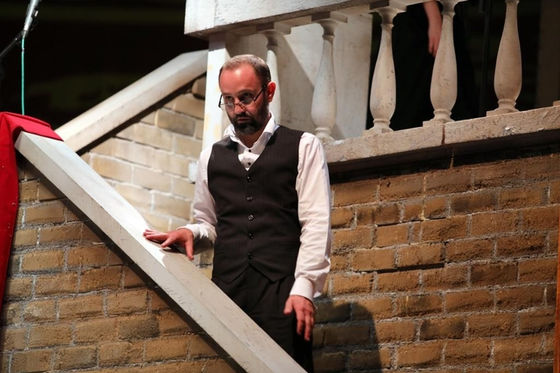
Alexander Morfov >> works >> theatre productions >> The Merchant of Venice | I. L. Caragiale National T...

The Merchant of Venice
I. L. Caragiale National Theatre of Romania, Bucharest
premiere 20 and 22 September 2019, Main stage
By
Translator
Stage version and director
Set design
Costumes
Choreographer
Light designer
Cast:
William Shakespeare
Dragoș Protopopescu
Alexander Morfov
Gabi Albu
Liliana Cenean
Inga Krasovska
Chris Jaeger
Shylock Ion Caramitru Antonio Richard Bovnoczki
Portia Ada Gales Bassanio Alexandru Potocean
Nerissa Cosmina Olariu Graziano Silviu Mircescu
Jessica Flavia Giurgiu Lorenzo Ciprian Nicula
Lancelot Emilian Marnea Doge Mihai Calota
Solanio Petre Ancuta Salarino Florin Calbajos
Tubal/ Nephew of the Duke of Saxony Mihai Muntenita
Angelica Stefania Circu/ Cristina Simion
Prince of Morocco Shahbazimoghadam Mohammad Jawad
Translator Dragoş Dumitru
cameo appearances by Aurelian Ungurianu, Silviu Negulete
Written in the end of 16-th century, “The Merchant of Venice” sounds as modern as could be. Shakespeare’s play is ofted labelled as controversial due to its delicate net of avarice, racism and vengeance – interwoven and interdependent of each other.
Antonio is a merchant who has recently sent his ships to trade with the east. He lends money from the Jewish moneylender Shylock to help his friend Bassanio win the heart of the wealthy Portia. As it turns out, there are more than one couples in love. Lorenzo, a friend of Bassanio’s, falls in love with Jessica, Shylock’s daughter as she elopes with him, the christian, but not before taking some of the family’s treasures with her. Graziano, also their friend, falls in love with Nerissa, Portia’s maid. Shortly, a somber shadow is cast over the happiness of the young. Antonio’s ships are lost at sea, debts are merciless and he was unable to return the money to Shylock.
Avarice has become rage which is eating out the moneylender’s mind like a parasite. Armed with a signed contract, the rage is setting for a lawsuit to regain its stake. The stake? A pound of Antonio’s flesh. Human flesh is about to become a victim of the monstrous thirst for vengeance that will readily tear pieces of meat from a living being, witnessing his blood draining drop by drop, severing him slowly and painfully, destroying him physically. But remember – this beastly act is triggerred by the purest and the most sacred of all aims – two young people who could find and love each other forever. More than two, as a matter of fact. The blissful dreams of loving and the freehearted friendship are blasted by crooked avarice. Anything that’s human, dignified, beautiful and honorable is subdued to legal brutality in the expression of one small signature on one small sheet of paper.
What are we to prefer – being lawful or being just – this is a question which the 20th century partially posed while the 21st century certainly complicated. If it is not the law but it is justice – whose justice should it be – mine, yours, Jesus’, Allah’s, Jahweh’s? And if it is not justice, then how does it matter what it is, be it the law? Our civilization is yet to decide which is more sacred. Each of us has his own answer and, therefore, there can be no answer yet.
In the mind of the modern person it is a well-known fact that “law” does not always equal “justice”. This concept is designed by partucilar and painful examples. Realisation of this tragic discrepancy is always ascertained by every other occuring social grotesque which separates the people into rival groups – those who insist on following the rules and those who insist on preserving human values. One thing is for sure – they are both right. These two ultimate truths are fighting on a knightly duel as each of them embodies a knightly honour and each can be killed. But could it be possible that these scales were balanced and law reached justice?
In order to help their husbands Portia and Nerissa disguise as lawyers. Shylock is about to win the case but the women offer a scary argument – he has to cut exactly one pound of flesh, not even with a hair’s weight of difference. The moneylender loses not only the case but his fortune and even his life are at stake. It all now depends on the mercy of Antonio and the Duke who pose two conditions – his daughter, Jessica, to inherit his fortune and him to convert to Christianity. The happy end is amplified by the news that Antonio’s ships are safely returning.
There is drama and comedy, farce and romance, impressive set design and interpretation beyond conceivable limits in this production. Shylock is not simply a moneylender. Antonio is not simply a good friend. Bassanio is not simply in love. Nothing is ever simple neither in Shakespeare, nor in Morfov. Apart from one thing – Alexander Morfov, as always, builds his stage universe on the most unyielding foundation. Simply, morals.




















